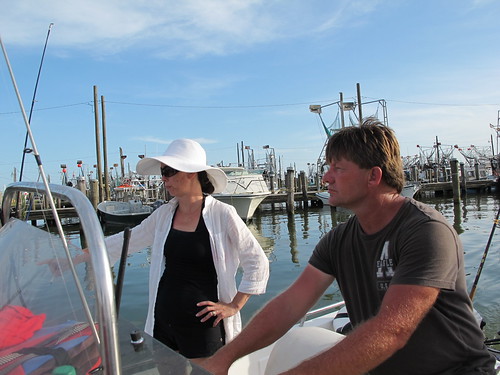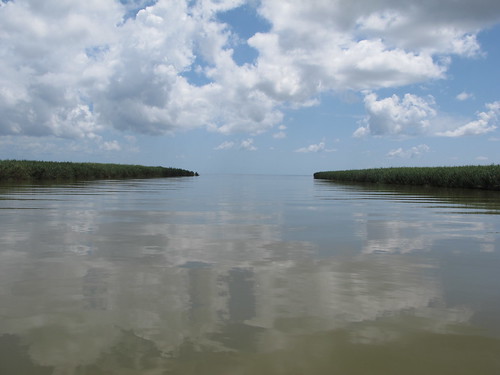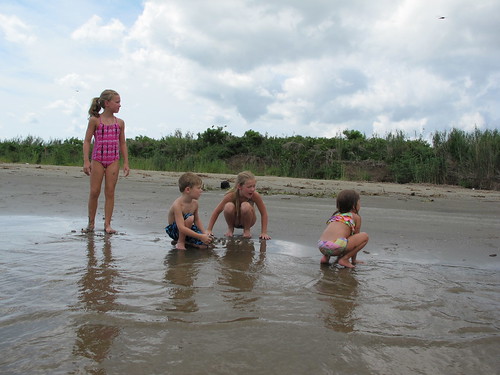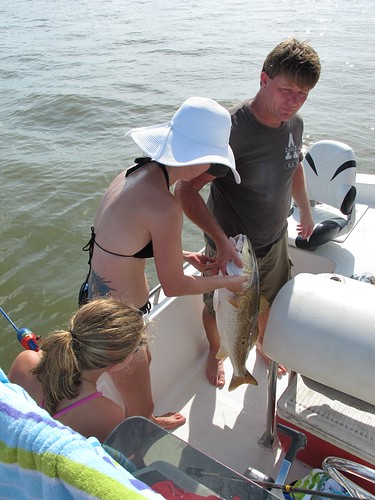To the End of the Bayou; a Gulf Memory for Our Kids
For more than a year, I’ve watched Gulf Coast residents suffer through the worst oil spill in history, their lives turned upside down by the shock and emotional trauma of BP’s oily assault. But through these agonizing times I’ve also grown to love and appreciate the Gulf environment and its people. I’ve vowed to take my two young daughters to witness firsthand the beauty of the bayou threatened by the encroaching waves of the Gulf.
Last weekend we finally got our chance. It turned out to be the best trip I’ve taken in the bayou, and I’ve taken a few . But this one was pure pleasure, a boat ride to the tip of Big Muddy with my fishermen friends David and Kindra Arnesen and their two kids. It would be a beach picnic and some fishing, a Cajun good time.
It was a welcome change. I’ve watched the Arnesen family suffer greatly through the worst oil spill in history. Last year I saw their business come to a screeching halt as oil soaked waves washed into their fishing grounds 80 miles south of New Orleans.
Like many of his fisherman colleagues, David worked on the oil cleanup and developed a severe respiratory reaction that still bothers him. Kindra and their two kids also developed respiratory problems and rashes. Their nine-year-old daughter still has serious breathing attacks, an ailment she never had before the BP well exploded and changed their lives. No one has covered their medical costs to find out what’s wrong.
For the Arnesens and many here in the fishing community of south Plaquemines Parish, it’s been tough getting back on their feet. Not only has BP not compensated them adequately for their economic losses, they say, but fishing has not returned to normal. Shrimp and crab catches are down dramatically in their area, one of Louisiana’s most productive. David has instead taken to fishing for king mackerel and mango snapper 15 to 20 miles out at sea to make ends meet.
But last weekend the Arnesen family tried to put all of that behind them. We joined them in the Venice marina as they packed up their fishing rods and a picnic lunch and set out on their speedy 20 ft skiff for an hour’s boat ride through the bayou to the Gulf.

Kindra and David Arnesen in the Venice marina Photos by Rocky Kistner/NRDC
As David motored out of the Venice marina, we passed dozens of commercial shrimp boats waiting for the white shrimp season to open at the end of the month. For most fishermen here, this is a make or break moment. The early summer brown shrimp season was a disaster for many. Shrimp catches were down, the market price was the worst in memory and spiking gas prices made it uneconomical to even get out on the water. If the upcoming white shrimp catches are down, you can turn out the lights here in Venice, some fishermen say.
David is not optimistic. He sees too many signs that things are not right with the shrimp catches so far. But what worries David even more is what he’s seeing—or not seeing—in the waters 20 miles offshore. He’s not seeing many small bait fish that snapper and mackerel--all predator fish--depend on. David says many fish bellies he sees are often empty, signaling they may be starving, and that some contain an unusual black substance he believes is linked to oil. Other fish David catches have lesions or strange markings that other scientists are finding too. He’s been unable to get authorities to pay attention to it. And some simply don’t want to, he says.
“We’re damned if we do and damned if we don’t,” David says in a soft southern drawl that punctuates his decades of fishing in the Gulf. “Some people say we shouldn’t say anything about things that aren’t right so we can protect our markets. Others say we should complain so we make BP accountable. But from what I’ve seen around here, BP hasn’t been accountable for much of anything.”
That’s a common complain among the fishermen community in the Gulf. BP’s $20 billion compensation fund has been the target of constant complaints for refusing payments to those who truly deserve it. Still nothing seems to change, people here say.
But David and Kindra are trying not to think about this as we all zip down the main Mississippi River channel and splinters into half a dozen passes, draining 40 percent of the continental U.S. These passes are shallow and tricky, but David knows his way through them like a bottle nose dolphin racing to his favorite fishing grounds.
After cutting though canals lined by endless miles of Rosocane and marsh grass, the great expanse of the Gulf bursts into view. The open waters of the vast ocean are dotted with giant oil platforms, a reminder of the ongoing threat below. Soon we find a small secluded beach tucked in the coastal marsh, a wetlands eroding at the alarming rate of over a football field an hour.

Louisiana bayou opens to the Gulf near Southeast Pass
The brown sandbank is hard and firm, and the ocean water is soupy in the hot August sun. Mullet fish jump and splash in the water nearby. The kids roam the beaches looking for shells as we grab a cooler and a watermelon to eat a picnic lunch. It’s hard to imagine such an idyllic spot could be found at the mouth of the mighty Mississippi where giant barges and cargo ships roam the river day and night.
After lunch, we jump back in the boat and try out some fishing, quickly catching and releasing hungry catfish as soon as we toss out our lines. Then Kindra snags something big, slowly and painfully reeling it in. It’s a 15-pound redfish, the fish that New Orleans chef Paul Prudhomme made famous. We haul it in and throw it in a storage box. It would make a tasty meal later.
Soon we pull in our fishing lines and prepare for the long journey home. David fires up the engine and we speed back into the bayou, leaving the Gulf at our backs. Storm clouds gather in the distance. We all felt fortunate to find a spot where the bayou is still healthy, where sea life has not been irreparably changed by the historic oil disaster.


Kids play near the mouth of the Mississippi River; Kindra and David haul in a 15 pound redfish.
But the health of the gulf is still far from certain. Scientists continue to study the environmental damage caused by more than 170 million gallons of BP oil spewed into the sea. And lawyers gather massive amounts of evidence for huge liability battles to come.
In the meantime, fishermen like David Arnesen can only hope the fishing quickly returns to normal. They will find out soon when the shrimp season reopens this month. Everyone hopes it does. But many fishermen don't expect things to return to normal anytime soon.
Still, I’m hopeful my kids will remember the Gulf they saw that day; the baby alligator swimming lazily through the marsh, the white egrets standing gracefully at the waters’ edge, the brown pelicans skimming along the water like pterodactyls chasing their prey.
I’m relieved they’ve seen it firsthand. It’s seared into their memories. I hope in the years to come this trip will remind them why these critical life sustaining wetlands are so important to defend. It’s their generation after all that will bear the brunt of our abuse of the environment and our senseless addiction to dirty fossil fuels. We all bear responsibility to get our political leaders to act and pass laws that protect the oceans.
This survival of the Gulf ecosystem—and the natural beauty it entails—depends on younger generations to change course and make it right. Really right. I'm inspired by Radha Adhar, an NRDC colleague and proud member of the upcoming Millennial generation, who recently blogged about young people rising to the challenge of climate change; “This is the most important fight, and we are the most important voice.”
I hope my girls get that message. I hope our political leaders do too. Because if they don’t, trips like this one to the tip of the bayou will be a distant memory for all generations to come.
